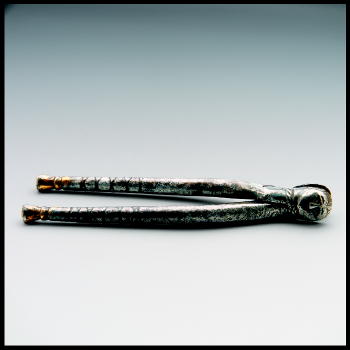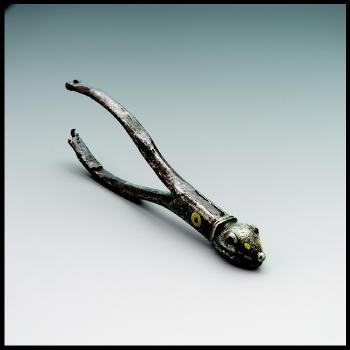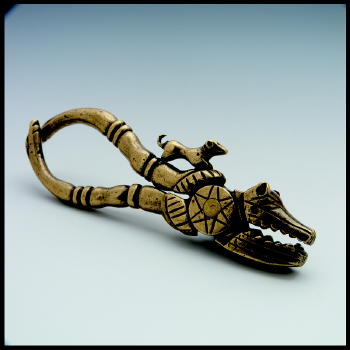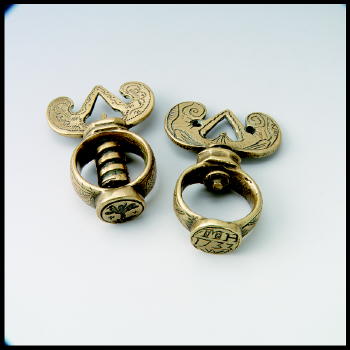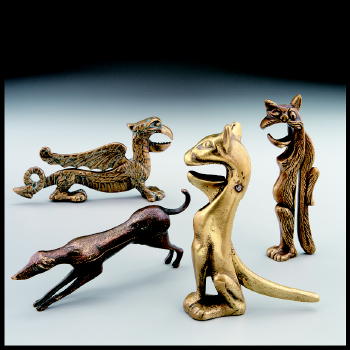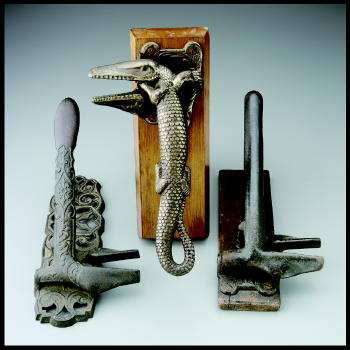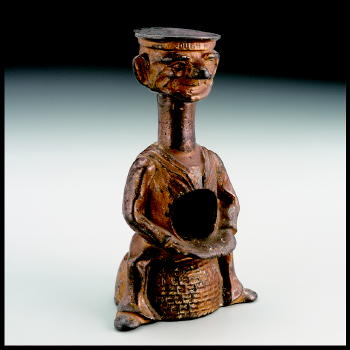Nutcracker Museum
Visit our Sister Sites at:
www.kidslovenutcrackers.com and
www.nutcrackerday.com
August 2017 Newsletter from The Nutcracker Lady
You will find many interesting metal nutcrackers in the museum and we have to remember that the early metalworkers worked with red-hot metal as they shaped the various figures.
Late 15th or early 16th century...
From the late 15th or early 16th century we have a hand wrought iron lever
with a human face. It is very small, measuring a little over 5 inches and
was no doubt used for the cob nuts—the early form of the popular hazel nut. |
Late 16th or early 17th century
A salamander head decorates this late 16th or early 17th century nutcracker
from France. It is made of iron with brass trim and measures 5 inches. |
From the 18th Century
An 18th century brass nutcracker from France depicts a canine on back of a
reptile. Similar canine figures were used as decoration on nutcrackers as
early as the 14th Century. |
Both from 1733...
Two small brass screw nutcrackers are shown--one shows the date of 1733,
while the other also serves as a wax seal stamp. They were made in Holland
and are called “Pocket Screws” for it was the custom of men to carry tiny
nutcrackers like this with them. |
Early part of 20th century...
Many nutcrackers in animal form were created in England in the early part of
the 20th century. These nutcrackers were molded of brass and bronze . |
Created in the U.S. in 1853 and 1856...
The Blake nutcracker shown on the right was created in the United States in
1853. The decorative variation on the left was done in 1856, and the
crocodile adaptation appeared later. |
From England in 1897...
The Tough Nut originated in England in 1897. This is a percussion
nutcracker. The nut is inserted in the body, then with a strong whack on the
head, the nut is cracked. |
|
Arlene Wagner,
The
Nutcracker Lady
|
07/23/21
Quick Links
Dogs that are able to be carried at all times may come into the museum.
Service animals are
always welcome.
Contact Us
735 Front Street
P.O. Box 2212
Leavenworth, WA 98826
(509) 548-4573
MUSEUM HOURS
11:00PM - 5:00PM Daily
We suggest visitors arrive at the museum at least 30 minutes before closing.
Nutcracker Museum Mission Statement:
"To foster and encourage the interest of the general public of the importance of nuts in the diets of humans throughout history and in the evolution of the nutcracker. No other tool or collectible has shown such a wide diversity of material and design as the implements used to crack the hard shell of a nut".
Museum Admission:
Adults - $5.00 (Ages 17 - 64yrs)
Seniors - $3.50
(Age 65yrs +)
Youth - $2.00 (Ages 6 - 16yrs)
Child - FREE (Ages 0 - 5yrs)
Active
Military - FREE (Spouse & Children Free with ID)
